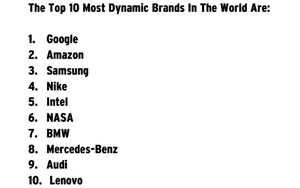Google Ranks As Most Dynamic Brand
by Larissa Faw, Staff Writer, June 20, 2016

CANNES, FRANCE — Google is the top brand poised to succeed in the future, according to IPG Mediabrands’ inaugural D100 report in partnership with Jonah Berger, Associate Professor, The Wharton School at The University of Pennsylvania and New York Times best-selling author of Contagious: Why Things Catch On.
The report – released during the Cannes Lions here – queried global consumers about which brands are well-rounded in both traditional metrics and newer influences across social media. The report then measured these findings through four key dimensions: How agilely brands adjust to changing market conditions; Responsiveness to which brands listen and respond to customers; Innovation; and Sociability to assess how large and engaged a brand’s audience is on social media.
“We applied a rigorous and comprehensive methodology that showcases which brands are driving the future,” says Berger. “Ultimately, it is not about being relevant today; it’s about being transformative tomorrow.”
Rounding out the top 10 on the D100 list are Amazon, Samsung, Nike, Intel, NASA, BMW, Mercedes-Benz, Audi, and Lenovo.
Apple, notably, manages to only barely make the top 25 to come in at 22, which Berger says is impacted by the tech brand’s engagement across social media. It is really important to have consumers share and engage with content, and Apple is not very responsive to its consumers, he says. Uber is another company that has had challenges reacting to consumer interactions, thus impacting its ranking at 82, says Berger.
The list may be biased for tech brands. Nine of the top 10 are tech-leaning companies. There are no media, retail, or luxury brands. Yet these examples illustrate the list’s relevance, says Berger. At its core, the research shows that the world has fundamentally changed. Being the largest and oldest brand used to guarantee continued success. In today’s fast-paced, socially connected marketplace, it is not just a brand new world it is a new brand world, with these four metrics serving as the underpinnings for brand vitality and perpetual growth.
Furthermore, there is a clear and positive relationship between the dynamic score and company’s performance, says the report. Dynamic brands, defined as brands that scored one standard deviation above the mean in dynamism, had 2.7% higher percentage Q4 revenue growth from 2014 to 2015, versus brands that did not make the dynamism cut. “While this percentage may not seem significant on its own, the average revenue growth across brands, generally, is only 4.4%. The relationship between dynamism and revenue growth persists even when controlling for more traditional brand metrics such as brand awareness and size,” the report states. “This suggests that brand dynamism drives future performance above and beyond more traditional brand measures.”
The report queried more than 10,000 consumers across four global regions in five major markets including the United States, United Kingdom, Germany, China, and India. Consumers were asked questions on both global brands and market specific brands; in total over 1,200 brands. Global brands were defined by large, multinationals that had at least some presence in multiple key markets (e.g., Coca-Cola, Nike and BMW). Market- specific brands were smaller brands that may only be present in a single market (e.g., Royal Mail – UK or Hajmola – India).
The full report can be found at
MediaPost.com: Search Marketing Daily
(14)


